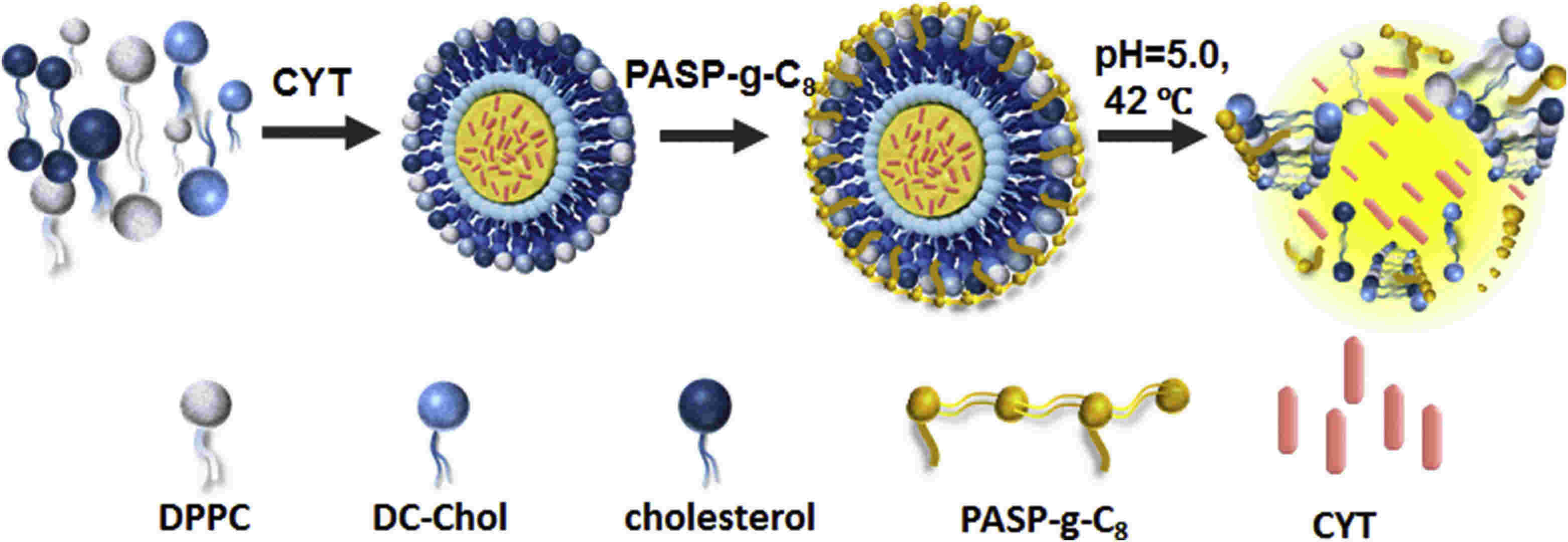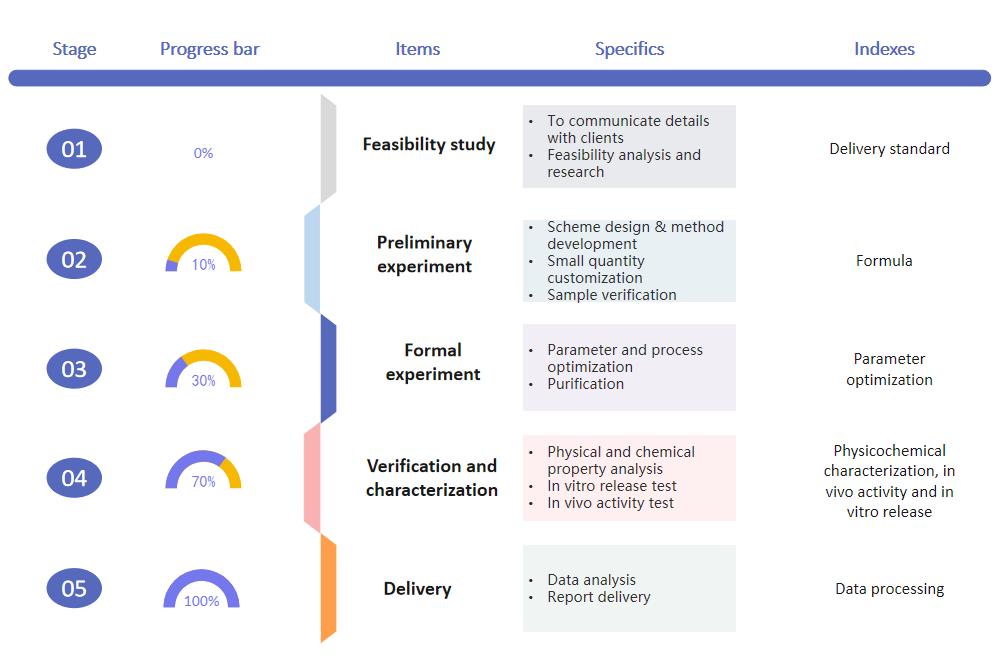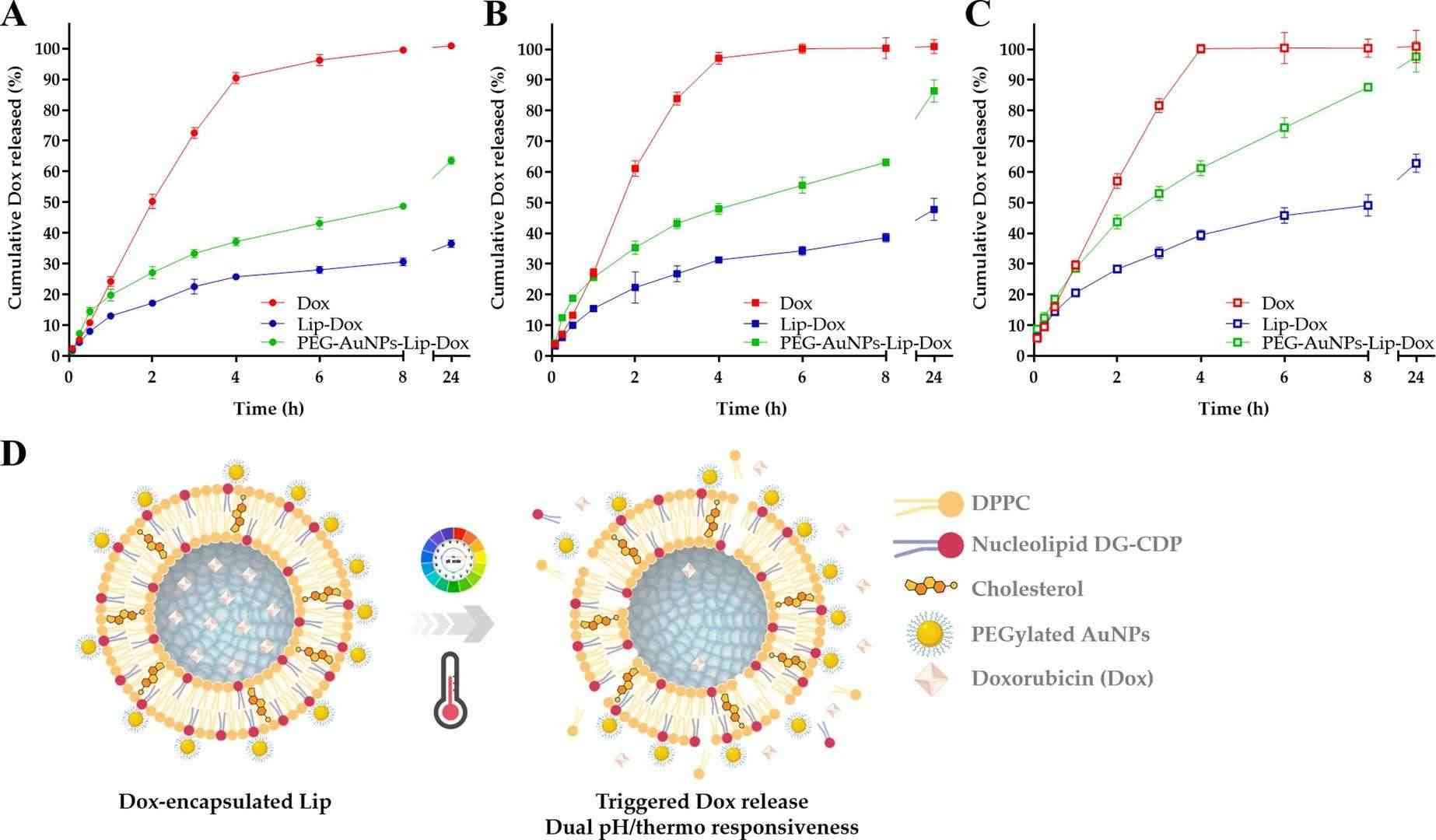Custom pH-temperature Responsive Liposome Service
Inquiry
The pH-temperature responsive liposome delivery system is highly regarded for its ability to precisely target cancer cells within deep tissues by responding to both temperature and pH changes. CD Formulation supports the development of intelligent liposomes through the application of state-of-the-art technology and professional expertise to design high-performance liposomes with dual temperature and pH responsive capabilities.
Mechanism of pH-temperature Responsive Liposomes
By incorporating pH-sensitive polymers into liposomes and utilizing thermosensitive polymers such as DMPC, DPPC, DSPC, etc. as the liposome membrane material, composite thermosensitive liposomes responsive to both pH and temperature can be developed. Upon endocytosis by cells, these liposomes accumulate in acidic pH organelles (endosomes and lysosomes) or cancer tissues. When the tumor site is subjected to heat, simultaneous triggers of pH and temperature stimulation lead to reorganization or rupture of the liposome membrane structure, altering its permeability to release anticancer drugs. Therefore, dual-stimulus (temperature and pH) sensitive liposomes benefit for precise drug delivery deep within tissues. While single-sensitive liposomes already exhibit effective targeting and utilization for cancer cells, dual-sensitive liposomes offer distinct advantages including a straightforward preparation process, versatile applications, and heightened sensitivity to cancer cells.
 Fig.1 Schematic of PASP-g-C8 modified composite pH/temperature-sensitive liposomes. (Yilin Zhao, et al., 2020)
Fig.1 Schematic of PASP-g-C8 modified composite pH/temperature-sensitive liposomes. (Yilin Zhao, et al., 2020)
Our pH-temperature Responsive Liposome Customization Service
Study on pH-temperature dual responsive strategy
Through this service, we help clients explore the pH and temperature response mechanisms, as well as access screening services for each response trigger, including temperature trigger factors (e.g. drug release under various light exposures (such as lasers)).
Polymers and copolymers synthesis and screening
The service is primarily utilized for screening monomers of temperature-sensitive polymers and pH-sensitive polymer monomers, matching and synthesizing dual-sensitive (pH and temperature) copolymers, as well as determining the conformational transformation mechanism of polymer chains following heat exposure through DSC measurements of absorption peaks and homogenization points.
Temperature-sensitive lipid material screening
This service helps clients screen suitable thermosensitive lipid materials such as DMPC, DPPC, DSPC, etc.
Liposome surface grafting service
This service entails liposome grafting with polymers and copolymers, achieving a dual-responsive effect by grafting thermosensitive or pH-sensitive polymers onto the liposome surface.
Application services
The service integrates the client's intended application with customized dosage forms, such as hydrogels for transdermal formulations and injectables for targeted delivery.
 Fig.2 Our workflow for custom pH-temperature responsive liposome service. (CD Formulation)
Fig.2 Our workflow for custom pH-temperature responsive liposome service. (CD Formulation)
Our Platforms for pH-temperature Responsive Liposome Customization
| Techniques and Platforms |
Specifics |
| pH-temperature Responsive Development Platform |
- Supporting to study of the trigger mechanism of pH and temperature stimuli.
- Trigger factor filtering and matching.
- Study on the binding strategy of trigger factor and liposome.
|
| Surface Modification Techniques & Polymers and Copolymers Synthesis |
- Liposome surface grafting by polymers and copolymers.
- To support the synthesis of polymers and copolymers that respond to both pH and temperature.
|
| Platform for Product Application Development |
- To support the development of levels and purity that are appropriate for specific application scenarios.
- To support the development of different dosage forms such as hydrogels for transdermal formulations and injectables for targeted delivery.
|
| Liposome Characterization Platform |
- Physical and chemical properties.
- In vitro (including release, cytotoxicity, and cell uptake) and in vivo characterization (including biological activity and in vivo distribution experiment).
|
Why Choose CD Formulation?
- First-class pH temperature dual sensitive development technology. For many years, we have been dedicated to the development of intelligent liposome delivery systems tailored to different response stimuli. Our extensive experience includes the advancement of pH/temperature dual-responsive liposomes, as well as the development of pH/temperature dual-responsive polymers and copolymers, along with liposome surface conjugation technology using branched polymers.
- Smart pH/temperature-responsive delivery system development platform. The platform supports the development of pH-temperature dual-responsive liposome formulations, process optimization, and analytical characterization (in vitro and in vivo).
- Top technical team. Our technical team consists of highly skilled scientists specializing in chemistry, immunology, medicine, biology, and related fields. They have extensive expertise in developing pH-temperature bi-responsive liposomes.
- Flexible customization scheme. Our pH-temperature dual-responsive liposome formulations can be tailored to suit the requirements of diverse sectors, encompassing pharmaceutical delivery, medical imaging, cellular manipulation, and agricultural applications.
Published Data
Technology: pH-temperature dual-sensitive liposome technique
Journal: International Journal of Pharmaceutics
IF: 5.3
Published: 2022
Results: In this study, the authors utilized 1,2-di-palmitoyl-sn-glycero-3-(cytidyldiphosphate) (DG-CDP) to engineer pH/thermally responsive liposomes containing nucleic acids, which were stabilized through interaction with 1,2-di-palmitoyl-sn-glycero-3-phosphocholine (DPPC) and cholesterol, anchored by NH2-polyethylene glycol-conjugated gold nanoparticles (PEG-AuNPs, 15 nm) for triggering the release of doxorubicin (Dox). In summary, these stimulus-responsive nanocarriers based on liposomal formulations show promising characteristics for cancer nanomedicines and hold potential for thermotherapy.
 Fig.3 The effects of pH and temperature on the in vitro release of doxorubicin (Dox) from liposome. (Mónica C. García, et al., 2022)
Fig.3 The effects of pH and temperature on the in vitro release of doxorubicin (Dox) from liposome. (Mónica C. García, et al., 2022)
With state-of-the-art technology and platforms, CD Formulation is dedicated to delivering intelligent pH-temperature dual-responsive liposomes to our customers. If you require any assistance, please do not hesitate to contact us.
References
-
Yilin Zhao, Fuli Cai, et al. A high stable pH-temperature dual-sensitive liposome for tuning anticancer drug release. Synthetic and Systems Biotechnology. 2020, Volume 5, Issue 2, Pages 103-110.
- Mónica C. García, José Manuel Calderón-Montaño, et al. pH-temperature dual-sensitive nucleolipid-containing stealth liposomes anchored with PEGylated AuNPs for triggering delivery of doxorubicin. International Journal of Pharmaceutics. 2022, Volume 619, 121691.
How It Works
STEP 2
We'll email you to provide your quote and confirm order details if applicable.
STEP 3
Execute the project with real-time communication, and deliver the final report promptly.
Related Services

 Fig.1 Schematic of PASP-g-C8 modified composite pH/temperature-sensitive liposomes. (Yilin Zhao, et al., 2020)
Fig.1 Schematic of PASP-g-C8 modified composite pH/temperature-sensitive liposomes. (Yilin Zhao, et al., 2020) Fig.2 Our workflow for custom pH-temperature responsive liposome service. (CD Formulation)
Fig.2 Our workflow for custom pH-temperature responsive liposome service. (CD Formulation) Fig.3 The effects of pH and temperature on the in vitro release of doxorubicin (Dox) from liposome. (Mónica C. García, et al., 2022)
Fig.3 The effects of pH and temperature on the in vitro release of doxorubicin (Dox) from liposome. (Mónica C. García, et al., 2022)
